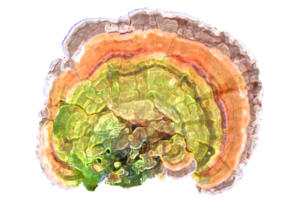dieLiu C, Gao P, Qian J, Yan W
Abstract
Fungus polysaccharides compounds (FPC) are the mixture of procyanidins oligomers, glycyrrhetinicacid and polysaccharides of Hericium erinaceus, lentinus edodes and poria cocos. The antitumor effects of FPC and its immunity regulating effects as an immunostimulant on the mice burdened with sarcoma 180 (S-180) were studied. FPC (100, 200 and 400 mg/kg BW) was gavaged to mice for 31 days. S-180 was transplanted to these mice on the 21th day. Lentinus edodes group was gavaged 200 mg/kg BW saccharine of lentinus edodes. The results showed that FPC could inhibit the growth of S-180 effectively. The inhibitory rates were 37.74%, 44.73% and 48.32% respectively. The antineoplastic activity of FPC (200 mg/kg. BW) was more effective than polysaccharide of lentinus edodes at the same dose. In S-180 burdened mice, the percentage of L3T4 and the ratio of L3T4/Lyt-2, NK activity and the induced IL-2, IFN-gamma levels were decreased significantly compared with the normal control group. As an immunostimulant, FPC could increase the percentage of L3T4 and the ratio of L3T4/Lyt-2 in S-180 burdened mice, but had no significant effects on the percentage of Lyt-2. Polysaccharide of lentinus edodes alone could also increase the immunity competence of mice burdened with S-180, but was not better than that of FPC at the same dose. It could be concluded that the compound of antineoplastic component could be synergetic.
Reference:
Wei Sheng Yan Jiu. 2000 May 30;29(3):178-80

